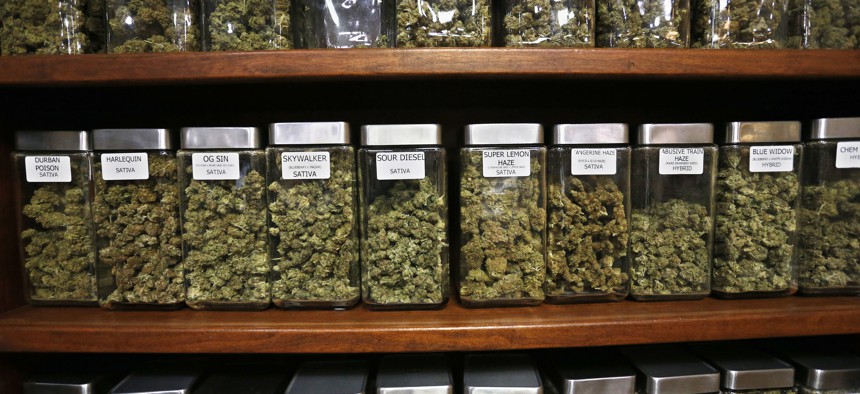Governors Talk Recreational Pot Legalization

Glass containers display varieties of marijuana for sale on shelves at The Station, a retail and medical cannabis dispensary, in Boulder, Colorado. Gov. Jared Polis said his state is "years ahead" of other states in terms of marijuana legislation. Brennan Linsley/AP
At an event on Friday, a slate of governors spoke about the promises and difficulties in legalizing recreational marijuana.
While 10 other states legalized marijuana before Illinois, Gov. J.B. Pritzker notes that his state was the first to decide that recreational pot can be sold through legislation instead of by a voter referendum.
Speaking at Politico’s State Solutions conference on Friday, the Democratic governor suggested that other states follow that path.
The time lawmakers took to craft their legislation allowed them to think carefully about social equity, a key issue that repeatedly came up last year as state legislatures across the country debated legalization. Concerns about whether minority business owners would be able to participate in the new industry and difficulties working out expungement language about past convictions helped doom measures in New Jersey and New York.
“After people voted for it [in other states], it was a mass scramble to get the things done,” he said. “Ours was very intentional. So many other states on the verge of legalizing are looking at what we did now.”
Like Illinois, Vermont also approved cannabis legalization through legislation. But that state law didn’t approve commercial sales, only allowing people to grow the drug in their homes.
Illinois was also the first state to approve a marijuana law with social equity components, such as provisions to establish a fund from marijuana tax revenue for restoration grants given to communities disproportionately impacted by the war on drugs and another that gives people of color preferential treatment for business licenses in the marijuana industry.
But critics have said even with those provisions, Illinois hasn’t created a truly equitable marijuana market. In Chicago, some local leaders complained that none of the first round of dispensary licenses were granted to women or people of color.
Ald. Jason Ervin, chairman of City Council’s Black Caucus, fought last year to have legal marijuana sales in Chicago delayed until July 2020 so that the city could ensure that dispensary licenses were distributed more equitably. “We are concerned about the lack of African American participation, which stands currently at zero. And we’ve not heard any plan from the state or from anyone to change that,” Ervin told local news station WTTW in November. “The reality is that today I think that the state should create a system that would ensure African American ownership from the start.”
But Ervin’s measure failed and marijuana became legal in the city on January 1. All 11 dispensary owners are white men.
Pritzker on Friday said he is looking beyond dispensary licenses when he thinks about equity. He said the “massive pardon and expungement campaign” for those with low-level marijuana convictions will also play a part in equity. “The social equity component is much more than just allowing people to get into the industry who have been left out and left behind,” he said. “Cannabis convictions have been unfairly biased towards people of color and we’re correcting that.”

Pritzker also said that marijuana legalization will promote safer consumption, as the state had seen deaths from synthetic marijuana and illegally manufactured THC vaping cartridges. “What you get now from a legal dispensary is a product you know is safe,” he said.
Rhode Island Gov. Gina Raimondo, a Democrat, recently introduced legislation to legalize recreational marijuana that would be sold in state-owned stores. Though the proposal is considering a long shot in the legislature, Raimondo said she is hopeful lawmakers will hold hearings and discuss legalizing cannabis because of the drug’s status in neighboring states.
“Rhode Island is a tiny state,” she said. “Massachusetts has legalized, and Connecticut is about to … From my office in Providence to the closest marijuana shop in Massachusetts is a ten minute drive. To pretend we don’t have adult use marijuana in Rhode Island already is silly.”
For her, the issue is now simply one of safety. “This is about public health and safety,” she said. “Let’s have a responsible way to legislate this.”
Colorado Gov. Jared Polis, a Democrat who leads one of the first states to legalize sale of recreational marijuana, said that the state has a “thriving” cannabis industry on both the agricultural and entrepreneurial fronts. “We have a more mature industry than any other state. We’re several years ahead,” he said. “We want to keep that competitive advantage.”
To stay on the forefront of marijuana legislation, Polis said the state is focused on the financing problems of the industry. He said he supports the SAFE Act, a measure awaiting a vote in the U.S. Senate that would provide protections for banks involved in the cannabis industry, but emphasized that the state won’t wait for the federal government to act.
In 2019, Polis signed legislation to allow marijuana companies in the state to be publicly traded and take outside investments. This week, his administration released guidelines for local banks interested in financing businesses in the industry. “Under our state authority, we’re ensuring that cannabis companies have access to financial services,” Polis said.
Emma Coleman is the assistant editor for Route Fifty.
NEXT STORY: Some Nonprofit Hospitals Aren’t Earning Their Tax Breaks, Critics Say






